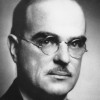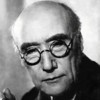Ambition makes the same mistake concerning power, that avarice makes concerning wealth; she begins by accumulating power, as a mean to happiness, and she finishes by continuing to accumulate it, as an end.
Charles Caleb "C. C." Colton (1780-1832) English cleric, writer, aphorist
Lacon: Or, Many Things in Few Words, Vol. 1, § 148 (1820)
(Source)
Digression is the soul of wit. Take the philosophic asides away from Dante, Milton or Hamlet’s father’s ghost and what stays is dry bones.
Ray Bradbury (1920-2012) American writer, futurist, fabulist
Fahrenheit 451, “Coda” Afterword (1979 ed.)
(Source)
A play on Shakespeare's words.
You also ask, if I think the world tendency is towards Fascism, why do I support the war. It is a choice of evils — I fancy nearly every war is that. I know enough of British imperialism not to like it, but I would support it against Nazism or Japanese imperialism, as the lesser evil. Similarly I would support the USSR against Germany because I think the USSR cannot altogether escape its past and retains enough of the original ideas of the Revolution to make it a more hopeful phenomenon than Nazi Germany. I think, and have thought ever since the war began, in 1936 or thereabouts, that our cause is the better, but we have to keep on making it the better, which involves constant criticism.
The means by which we live have outdistanced the ends for which we live. Our scientific power has outrun our spiritual power. We have guided missiles and misguided men.
Martin Luther King, Jr. (1929-1968) American clergyman, civil rights leader, social activist, preacher
Strength to Love, ch. 7 “The Man Who Was a Fool,” sec. 3 (1963)
(Source)
If a madman were to come into this room with a stick in his hand, no doubt we should pity the state of his mind; but our primary consideration would be to take care of ourselves. We should knock him down first, and pity him afterwards.
The spirit is willing, but the flesh is weak.
Mankind are apt to be strongly prejudiced in favor of whatever is countenanced by antiquity, enforced by authority, and recommended by custom. The pleasure of acquiescing in the decision of others is by most men so preferred to the toil and hazard of inquiry, and so few are either able or disposed to examine for themselves, that the voice of law will generally be taken for the dictates of justice.
No one is an unjust villain in his own mind. Even — perhaps even especially — those who are the worst of us. Some of the cruelest tyrants in history were motivated by noble ideals, or made choices that they would call “hard but necessary steps” for the good of their nation. We’re all the hero of our own story.
The original writer is not he who refrains from imitating others, but he who can be imitated by none.
[L’écrivain original n’est pas celui qui n’imite personne, mais celui que personne ne peut imiter.]
François-René de Chateaubriand (1768-1848) French writer, politican, diplomat
The Genius of Christianity [Le génie du Christianisme], Part 2, Book 1, ch. 3 (1802)
(Source)
Alternate translations:
- "The original style is not the style which never borrows of any one, but that which no other person is capable of reproducing." [tr. White (1856)]
- "An original writer is not one who imitates nobody, but one whom nobody can imitate."
Art is a jealous mistress, and, if a man have a genius for painting, poetry, music, architecture, or philosophy, he makes a bad husband and an ill provider.
Ralph Waldo Emerson (1803-1882) American essayist, lecturer, poet
“Wealth,” The Conduct of Life, ch. 3 (1860)
(Source)
Undoubtedly the highest function of statesmanship is by degrees to accommodate the conduct of communities to ethical laws, and to subordinate the conflicting self-interests of the day to higher and more permanent concerns.
To blame the poor for subsisting on welfare has no justice unless we are also willing to judge every rich member of society by how productive he or she is. Taken individual by individual, it is likely that there’s more idleness and abuse of government favors among the economically privileged than among the ranks of the disadvantaged.
What the object of senile avarice may be I cannot conceive. For can there be anything more absurd than to seek more journey money, the less there remains of the journey?
[Avaritia vero senilis quid sibi velit, non intellego. Potest enim quicquam esse absurdius quam, quo viae minus restet, eo plus viatici quaerere?]
Marcus Tullius Cicero (106-43 BC) Roman orator, statesman, philosopher
De Senectute [Cato Maior; On Old Age], ch. 18 / sec. 65 (18.65) (44 BC) [tr. Shuckburgh (1900)]
(Source)
(Source (Latin)). Alternate translations:Also I may not consceyue nor understande why avaryce & covetyse ought to be in an olde man for ther is no thyng more unreasonable nor more folyssh then is for to hepe gretter quantite of wordily goodes or of vitailles in the tyme when the man hath lesse wey for to endure & lyve.
[tr. Worcester/Worcester/Scrope (1481)]But as for the avarice and covetousness of old men, I am not acquainted therewith, neither do I know what it meaneth. For what can be more absurd or repugnant to all reason than for a wayfaring man, when his journey is now almost dispatched and brought to an end, and hath but little way to go, to provide and furnish himself with the more victuals, and the shorter that his journey is, the more to seek and purvey for costage?
[tr. Newton (1569)]But as for covetousnesse in age, I know not what it meanes; for there can be no greater absurdity, then when the journey is almost done, to take care to provide much more provision.
[tr. Austin (1648), ch. 19]Of Age's avarice I cannot see
What colour, ground, or reason there should be,
Is it not folly? when the way we ride
Is short, for a long voyage to provide.
[tr. Denham (1669)]As for Covetousness, and an eager Desire to heap up Riches in this World, when we are about to leave it, I must own, I know not what to make of it. For what in Nature can be more absurd, than to b e anxiously intent in making Provisions for our Journey, when we are almost at the End of it?
[tr. Hemming (1716)]As to Covetousness, what it can profit an Old Man I am at a Loss to imagine. For what in Life can be more absurd, than to overstock ourselves with Provision, when we are nigh our Journey's End?
[tr. J. D. (1744)]What covetousness in old men can mean, I must own, I cannot comprehend; for can any thing be more senselessly absurd, than that the nearer we are to our journey's end, we should still lay in the more provision for it.
[tr. Logan (1750)]As to avarice, it is inconceivable for what purpose that passion should find admittance into an old man's breast. For surely nothing can be more irrational and absurd than to increase our provision for the road, the nearer we approach to our journey's end.
[tr. Melmoth (1773)]But, as for avarice in an old man, I cannot understand what it purposes. For can anything be more absurd than to seek the more provisions the less remains of the journey?
[Cornish Bros. ed. (1847)]What avarice in an old man can propose to itself I cannot conceive: for can anything be more absurd than, in proportion as less of our journey remains, to seek a greater supply of provisions?
[tr. Edmonds (1874)]Avarice in old age is foolish; for what can be more absurd than to increase our provisions for the road the nearer we approach to our journey's end.
[Common English translation (e.g. (1873))]As for senile avarice, I do not understand what it means; for can anything be more foolish than, in proportion as there is less of the way to travel, to seek the more provision for it?
[tr. Peabody (1884)]As to greediness, I do not know
What it can mean. Can aught be more absurd
Than that as life draws to a close, we seek
More money to assist our journey's end?
[tr. Allison (1916)]As for avariciousness in the old, what purpose it can serve I do not understand, for can anything be more absurd in the traveler than to increase his luggage as he nears his journey's end?
[tr. Falconer (1923)]As for avarice in an old man, I simply can’t understand it; could anything be more ridiculous than to ask for more and more travel-funds as one’s journey grows closer and closer to its end?
[tr. Copley (1967)]But greed is another thing altogether. I can never understand why elderly men are so attached to their money. What could be more pointless? Toward the end of a journey, one’s travelling expenses ought to be less, rather than more.
[tr. Cobbold (2012)]When it comes to old people’s avidity,
It is altogether beyond my pale
To seek more food when shorter is the trail.
[tr. Bozzi (2015)]
I believe in an America where the rights that I have described are enjoyed by all, regardless of their race or their creed or their national origin — where every citizen is free to think and speak as he pleases and write and worship as he pleases — and where every citizen is free to vote as he pleases, without instructions from anyone, his employer, the union leader or his clergyman.
For it is a mad world and it will get madder if we allow the minorities, be they dwarf or giant, orangutan or dolphin, nuclear-head or water-conversationalist, pro-computerologist or Neo-Luddite, simpleton or sage, to interfere with aesthetics. The real world is the playing ground for each and every group, to make or unmake laws. But the tip of the nose of my book or stories or poems is where their rights end and my territorial imperatives begin, run and rule. If Mormons do not like my plays, let them write their own. If the Irish hate my Dublin stories, let them rent typewriters. If teachers and grammar school editors find my jawbreaker sentences shatter their mushmilk teeth, let them eat stale cake dunked in weak tea of their own ungodly manufacture.
Ray Bradbury (1920-2012) American writer, futurist, fabulist
Fahrenheit 451, “Coda” Afterword (1979 ed.)
(Source)
I have never seen anyone who loves virtue as much as he loves beautiful women.
[吾未見好德、如好色者也。]
Confucius (c. 551- c. 479 BC) Chinese philosopher, sage, politician [孔夫子 (Kǒng Fūzǐ, K'ung Fu-tzu, K'ung Fu Tse), 孔子 (Kǒngzǐ, Chungni), 孔丘 (Kǒng Qiū, K'ung Ch'iu)]
The Analects [論語, 论语, Lúnyǔ], Book 9, verse 18 (9.18) and Book 15, verse 13 (15.13) (6th C. BC – AD 3rd C.) [tr. Huang (1997)]
(Source)
The two analects are the same in Chinese, although the second is prefaced by an expression of despair or exasperation (e.g., "It's hopeless!" or "I should just give up!"). In both instances, it is attributed by Sima Qian to Confucius' irritation while riding behind Duke Ling of Wei and his beautiful wife, Nan Tzu.
Legge and other early translators number these as 9.17 and 15.12, as shown below.
(Source: 9.18, 15.13, Chinese). Alternate translations:I have not seen one who loves virtue as he loves beauty.
[tr. Legge (1861), 9.17, 15.12]I have not yet met with the man who loves Virtue as he loves Beauty
[tr. Jennings (1895), 9.17, 15.12]I do not now see a man who can love moral worth in man as he loves beauty in woman. (9.17)
I do not now see a man who loves moral worth as he loves beauty in women. (15.12)
[tr. Ku Hung-Ming (1898)]I have never yet seen a man whose love of virtue equaled his love of woman. (9.17)
I have never yet seen as man as fond of virtue as of beauty. (15.12)
[tr. Soothill (1910)]I do not see love of looking into the mind and acting on what one sees there to match love of someone having beauty. (9.17)
I have not seen anyone who loves acting from inwit as they love a beautiful person. (15.12)
[tr. Pound (1933)]I have never seen anyone whose desire to build up his moral power was as strong as sexual desire. (9.17)
In vain have I looked for one whose desire to build up his moral power was as strong as sexual desire. (15.12)
[tr. Waley (1938)]I have never yet seen people attracted by virtuous scholars as they are by beautiful women. (Reference)
I haven't yet seen people who love virtue as they love beauty. (Reference)
[tr. Lin Yutang (1938)]I have yet to meet a man as fond of high moral conduct as he is of outward appearances.
[tr. Ware (1950), 9.18, 15.13]I have yet to meet the man who is as fond of virtue as he is of beauty in women.
[tr. Lau (1979), 9.18, 15.13]I have never come across anyone who admires virtue as much as he admires sexual attraction.
[tr. Dawson (1993), 9.18, 15.13]I have never seen anyone who loved virtue as much as sex. (9.18)
I have never seen a man who loved virtue as much as sex. (15.13)
[tr. Leys (1997)]I have not seen one person who likes the virtuousness as likes the beauteousness. (9.18)
I cannot see the person who likes the virtuousness as likes the beauteousness. (15.13)
[tr. Cai/Yu (1998)]I have yet to meet the person who is fonder of excellence (de) than of physical beauty.
[tr. Ames/Rosemont (1998), 9.18, 15.13]I have never seen anyone who loves virtue the way he loves beauty.
[tr. Brooks/Brooks (1998), 9.18, 15.13]I've never seen anyone for whom loving Integrity is like loving a beautiful woman.
[tr. Hinton (1998), 9.18, 15.13]I have yet to meet a man who loves Virtue as much as he loves female beauty.
[tr. Slingerland (2003), 9.18, 15.13]I have never seen the person who loved virtue the way he loved physical beauty.
[tr. Watson (2007), 9.18, 15.13]I have never met a person who loved virtue as much as he loved physical beauty.
[tr. Chin (2014), 9.18]I have never seen anyone who loves virtues as much as sexy women.
[tr. Li (2020), 9.18, 15.13]
Wine gives a man nothing. It neither gives him knowledge nor wit; it only animates a man, and enables him to bring out what a dread of the company has repressed. It only puts in motion what had been locked up in frost.
Administrivia: WIST Goes Facebook!
I’m not a Facebook kind of guy, but a huge number of folks in the world are. So WIST now has a feed into Facebook. Just like the Twitter feed, this will give a platform-limited view of all the quotes I post on any given day, with a link to bring you to the original WIST post (which will include all the cool stuff like the full quotation, supplemental info, and author biography / picture).
So, if you think it would be convenient for you to follow WIST via Facebook, then Like us and Follow us and all that good FBish stuff, and tell your friends! Enjoy!
As you receive the stranger, so you receive your God.
Johann Kaspar Lavater (1741-1801) Swiss poet, theologian, physiognomist.
Aphorisms on Man, #340 (1788)
See Numbers 13:2.
Reading Lenin or Mao or Stalin, one is struck by the emphasis on the relationship between political, military, psychological, and economic factors … and on the need for dominating a situation by flexible tactics and inflexible purpose.
October: This is one of the peculiarly dangerous months to speculate in stocks. The others are: July, January, September, April, November, May, March, June, December, August, and February.
Take a drink because you pity yourself, and then the drink pities you and has a drink, and then two good drinks get together and that calls for drinks all around. No; he’d have one drink, maybe a little bigger than usual, before he went to bed.
Do not place a photograph of your favourite author on your desk, especially if the author is one of the famous ones who committed suicide.
Roddy Doyle (b. 1958) Irish novelist, dramatist, screenwriter
In “Ten Rules for Writing Fiction,” The Guardian (20 Feb 2010)
(Source)
Yet many men, being slaves to appetite and sleep, have passed through life untaught and untrained, like mere wayfarers. In these men we see, contrary to Nature’s intent, the body a source of pleasure, the soul a burden.
[Sed multi mortales dediti ventri atque somno, indocti incultique vitam sicuti peregrinantes transegere.]
Sallust (c. 86-35 BC) Roman historian and politician [Gaius Sallustius Crispus]
Bellum Catilinae [The War of Catiline; The Conspiracy of Catiline], ch. 2, sent. 8 [tr. Rolfe (1931)]
(Source)
Original Latin. Alt. trans.:"Yet we see in the mass of life numbers addicted to sloth and the gratifications of appetite; men uneducated and uninformed, who have passed their time like incurious travellers, of whom it may be said, the organs of bodily sensation were their delight, and their minds were no better than a burden." [tr. Murphy (1807)]"Yet many there are in the world who, abandoned to sloth and sensuality, without learning or politeness, pass their lives much like travellers; and who, in opposition to the design of nature, place their whole happiness in animal pleasure, looking on their minds as a heavy burden." [tr. Rose (1831)]"But many men abandoned to their belly and sleep, untaught and uneducated, have spent their days like strangers, whose body in truth, contrary to nature, has been their happiness, their soul a burden." [Source (1841)]"Yet many human beings, resigned to sensuality and indolence, uninstructed and unimproved, have passed through life like travelers in a strange country; to whom, certainly, contrary to the intention of nature, the body was a gratification, and the mind a burden." [tr. Watson (1867)]"Many, however, the slaves of gluttony and sloth, without learning or cultivation, have passed through life as though it were a journey in a foreign land, and thus, in defiance of nature, have actually found their body a pleasure and their real vital powers a burden." [tr. Pollard (1882)]"But many mortals, devoted to their stomachs and to sleep, have passed through life untaught and uncouth, like foreign travellers; and of course, contracy to nature, their bodies were a source of pleasure to them, their minds a burden." [tr. Woodman (2007)]
I had first noticed her in the lobby of the Churchill, because she rated a glance as a matter of principle — the principle that a man owes it to his eyes to let them rest on attractive objects when there are any around.
It is an advantage to all narrow wisdom and narrow morals that their maxims have a plausible air; and, on a cursory view, appear equal to first principles. They are light and portable. They are as current as copper coin; and about as valuable. They serve equally the first capacities and the lowest; and they are, at least, as useful to the worst men as to the best. Of this stamp is the cant of not man, but measures; a sort of charm by which many people get loose from every honourable engagement.
Life is sometimes hard. Things go wrong, in life and in love and in business and in friendship and in health and in all the other ways that life can go wrong. And when things get tough, this is what you should do.
Make. good. art.
I’m serious. Husband runs off with a politician? Make good art. Leg crushed and then eaten by mutated boa constrictor? Make good art. IRS on your trail? Make good art. Cat exploded? Make good art. Somebody on the Internet thinks what you do is stupid or evil or it’s all been done before? Make good art. Probably things will work out somehow, and eventually time will take the sting away, but that doesn’t matter. Do what only you do best. Make. good. art.
Make it on the good days too.Neil Gaiman (b. 1960) British author, screenwriter, fabulist
Speech (2012-05-17), Commencement, University of the Arts, Philadelphia [10:08]
(Source)
(Source (Video)). In the video, he starts it as "Sometimes life is hard." In the middle, he says it as, "Somebody on the Internet thinks what you're doing ..." He also adds "Make it on the bad days" before the final sentence.
Americans see history as a straight line and themselves standing at the cutting edge of it as representatives for all mankind. They believe in the future as if it were a religion; they believe that there is nothing they cannot accomplish, that solutions wait somewhere for all problems, like brides.
I had become a new person; and those who knew the old person laughed at me. The only man who behaved sensibly was my tailor: he took my measure anew every time he saw me, whilst all the rest went in with their old measurements and expected them to fit me.
It is no good reason for a man’s religion that he was born and brought up in it; for then a Turk would have as much reason to be a Turk as a Christian to be a Christian.
William Chillingworth (1602-1644) English churchman and theologian
Religion of Protestants, ch. 2, sec. 113 (1687)
(Source)
CLAUDIUS: When sorrows come, they come not single spies,
But in battalions.William Shakespeare (1564-1616) English dramatist and poet
Hamlet, Act 4, sc. 5, l. 84ff (4.5.84-85) (c. 1600)
(Source)
If government, or those in positions of power and authority, can silence criticism by the argument that such criticism might be misunderstood somewhere, there is an end to all criticism, and perhaps an end to our kind of political system. For men in authority will always think that criticism of their policies is dangerous. They will always equate their policies with patriotism, and find criticism subversive.
Henry Steele Commager (1902-1998) American historian, writer, activist
“The Problem of Dissent” Saturday Review (Dec 1965)
(Source)
Reprinted in Freedom and Order (1966); also read into the US Congressional Record (26 Jun 1969).
If money be not thy servant, it will be thy master. The covetous man cannot so properly be said to possess wealth, as that may be said to possess him.
Francis Bacon (1561-1626) English philosopher, scientist, author, statesman
(Attributed)
Attributed to Bacon in Alexander Anderson, Laconics: or Instructive Miscellanies, (1827). Attributed to French moralist Pierre Charron (1541-1603) in John Timbs, Laconics: Or, The Best Words of the Best Authors (1829). See also French saying.
If by a “Liberal” they mean someone who looks ahead and not behind, someone who welcomes new ideas without rigid reactions, someone who cares about the welfare of the people — their health, their housing, their schools, their jobs, their civil rights, and their civil liberties — someone who believes we can break through the stalemate and suspicions that grip us in our policies abroad — if that is what they mean by a “Liberal,” then I’m proud to say I’m a “Liberal.”
You are certainly right in insisting on the strong metaphysical needs of mankind; but religion appears to me to be not so much a satisfaction as an abuse of those needs. At any rate we have seen that in regard to the furtherance of morality, its utility is, for the most part, problematical, its disadvantages, and especially the atrocities which have followed in its train, are patent to the light of day.
[So hast du gewiß Recht, das starke metaphysische Bedürfniß des Menschen zu urgiren: aber die Religionen scheinen mir nicht sowohl die Befriedigung, als der Mißbrauch desselben zu seyn. Wenigstens haben wir gesehn, daß in Hinsicht auf Beförderung der Moralität ihr Nutzen großentheils problematisch ist, ihre Nachtheile hingegen und zumal die Gräuelthaten, welche in ihrem Gefolge sich eingestellt haben, am Tage liegen.]
Arthur Schopenhauer (1788-1860) German philosopher
Parerga and Paralipomena, Vol. 2, ch. 15 “On Religion [Ueber Religion],” § 174 “A Dialogue [Ein Dialog]” (1851) [tr. Saunders (1890)]
(Source)
(Source (German)). Alternate translation:You are certainly right in advocating the strong metaphysical needs of mankind; but religions appear to me to be not so much a satisfaction as an abuse of those needs. At any rate we have seen that, in view of the progress of morality, its advantages are for the most part problematical, while its disadvantages, and especially the enormities which have appeared in its train, are obvious.
[tr. Dircks]You are certainly right in insisting on man's strong metaphysical need. Religions, however, seem to me to be not so much a satisfaction but an abuse thereof. at any rate, we have seen that, as regards the encouragement of morality, their use is to a great extent problematical, whereas their disadvantages, and especially the atrocities that have followed in their train, are as clear as the light of day.
[tr. Payne (1974)]
And yet there is a degree to which […] all literature, highbrow or low, from the Aeneid onward, is fan fiction. […] Through parody and pastiche, allusion and homage, retelling and reimagining the stories that were told before us and that we have come of age loving — amateurs — we proceed, seeking out the blank places in the map that our favorite writers, in their greatness and negligence, have left for us, hoping to pass on to our own readers — should we be lucky enough to find any — some of the pleasure that we ourselves have taken in the stuff we love: to get in the game. All novels are sequels; influence is bliss.
It behooves all men who wish to excel the other animals to strive with might and main not to pass through life unheralded, like the beasts, which Nature has fashioned groveling and slaves to the belly. All our power, on the contrary, lies in both mind and body; we employ the mind to rule, the body rather to serve; the one we have in common with the Gods, the other with the brutes. Therefore I find it becoming, in seeking renown, that we should employ the resources of the intellect rather than those of brute strength, to the end that, since the span of life which we enjoy is short, we may make the memory of our lives as long as possible.
[Omnis homines qui sese student praestare ceteris animalibus summa ope niti decet ne vitam silentio transeant veluti pecora, quae natura prona atque ventri oboedientia finxit. Sed nostra omnis vis in animo et corpore sita est; animi imperio, corporis servitio magis utimur; alterum nobis cum dis, alterum cum beluis commune est. Quo mihi rectius videtur ingeni quam virium opibus gloriam quaerere et, quoniam vita ipsa qua fruimur brevis est, memoriam nostri quam maxume longam efficere.]
Sallust (c. 86-35 BC) Roman historian and politician [Gaius Sallustius Crispus]
Bellum Catilinae [The War of Catiline; The Conspiracy of Catiline], ch. 1, sent. 1-3 [tr. Rolfe (1931)]
(Source)
Original Latin. Alt. trans.:"To maintain the dignity of human nature is the true ambition of man; and to that end it becomes the duty of all, who aspire to distinguish themselves from the race of inferior animals, to exert their most strenuous efforts, lest they pass their days in silence, like the herds of the field, formed by nature prone to the earth, and governed altogether by the incitements of appetite. Man is composed of mind and body, and in the exercise of both consists the energy of his nature. The mind is the directing principle; the body is subservient. The former we participate with the gods; the latter we hold in common with the brute creation. Hence the fame acquired by our intellectual powers has ever appeared to me the truest glory, far superior to all that can be achieved by mere corporeal vigor; and since the life we enjoy is frail and transitory, it should be the endeavour of every man to extend his fame, and leave a lasting memorial of his existence." [tr. Murphy (1807)]"Men who would act up to the dignity of their nature ought not to pass their lives in obscurity, like the beasts of the field, formed with bodies prone to the earth, and under necessary subjection to their appetites. Now, our faculties are twofold; those of the soul, and those of the body: the soul was designed for sovereign command, the body for subjection: the former we enjoy in common with the gods, the latter with the brute creation. So that to me it appears more agreeable to nature to pursue glory by the abilities of the mind than those of the body; and as our lives are but of short duration, it should be our study to render our memory immortal." [tr. Rose (1831)]"It becomes all men, who are anxious that they should excel other animals, to strive with their utmost might that they may not pass their life in silence like cattle, which nature has formed with their faces downwards, and slaves to their belly. But all our vigour is placed in the mind and in the body. We for the most part make use of the government of the mind, the submission of the body. The one we have in common with the gods, and the other with brutes. Wherefore it appears to me more proper to seek for glory by the abilities of the mind rather than by those of mere force; and since that life which we enjoy is short, to make the memory of ourselves as lasting as possible." [Source (1841)]"It becomes all men, who desire to excel other animals, to strive, to the utmost of their power, not to pass through life in obscurity, like the beasts of the field, which nature has formed groveling and subservient to appetite. All our power is situated in the mind and in the body. Of the mind we rather employ the government; of the body, the service. The one is common to us with the gods; the other with the brutes. It appears to me, therefore, more reasonable to pursue glory by means of the intellect than of bodily strength, and, since the life which we enjoy is short, to make the remembrance of us as lasting as possible." [tr. Watson (1867)]"Every man who is anxious to excel the lower animals should strive with all his power not to pass his life in obscurity like the brute beasts, whom nature has made the grovelling slaves of their belly. Now our whole ability resides jointly in our mind and body. In the case of the mind it is its power of guidance, in the case of the body its obedient service that we rather use, sharing the former faculty with the gods, the latter with the brute creation. This being so, I think it right to seek repute by my powers rather of intellect than of strength, and since the very life which we enjoy is short, to make the memory of us as abiding as may be." [tr. Pollard (1882)]"All persons who are enthusiastic that they should transcend the other animals ought to strive with the utmost effort not to pass through a life of silence like the cattle, which nature has fashioned to be prone and obedient to their stomachs. Our entire power resides in the mind as well as the body: we use the mind to command, the body to serve; the former we share wit the gods, the latter with the beasts. Therefore it seems to me more correct to seek glory with our intellectual rather than with our physical resources, and, because the very life that we enjoy is short, to ensure that a recollection of ourselves lasts as long as possible. [tr. Woodman (2007)]
Maintaining integrity as a private detective is difficult; to preserve it for the hundred thousand words of a book would be impossible for me, as it has been for so many others. Nothing corrupts a man so deeply as writing a book; the myriad temptations are overwhelming.
It is essential to persuade the soldier that those he is being urged to massacre are bandits who do not deserve to live; before killing other good, decent fellows like himself, his gun would fall from his hands.
HAL: Presume not that I am the thing I was;
For God doth know — so shall the world perceive —
That I have turn’d away my former self.William Shakespeare (1564-1616) English dramatist and poet
Henry IV, Part 2, Act 5, sc. 5, l. 60ff (5.5.60-62) (c. 1598)
(Source)
Mr Robinson was a polished sort of person. He was so clean and healthy and pleased about everything that he positively shone — which is only to be expected in a fairy or an angel, but is somewhat disconcerting in an attorney.
As soon as a true thought has entered our mind, it gives a light which makes us see a crowd of other objects which we have never perceived before.
[Aussitôt qu’une pensée vraie est entrée dans notre esprit, elle jette une lumière qui nous fait voir une foule d’autres objets que nous n’apercevions pas auparavant.]
François-René de Chateaubriand (1768-1848) French writer, politican, diplomat
“Pensées, Réflexions et Maximes,” Complete Works of Chateaubriand [Oeuvres Illustrées de Chateaubriand], Vol. 3, sec. 7 (1852)
(Source)
That truth is that monsters are real, and ghosts are real, too. They live inside us, and sometimes, they win.
If we are to survive, we must have ideas, vision, courage. These things are rarely produced by committees. Everything that matters in our intellectual and moral life begins with an individual confronting his own mind and conscience in a room by himself.
There is a connection, hard to explain logically but easy to feel, between achievement in public life and progress in the arts. The age of Pericles was also the age of Phidias. The age of Lorenzo de Medici was also the age of Leonardo da Vinci. The age of Elizabeth was also the age of Shakespeare. And the New Frontier for which I campaign in public life, can also be a New Frontier for American art.
John F. Kennedy (1917-1963) US President (1961-63)
Letter to Miss Theodate Johnson (13 Sep 1960)
(Source)
Published in Musical America (Oct 1960). Response to a letter from Johnson, publisher of the magazine, to Kennedy and Nixon asking their views on music in relation to the federal government and domestic world affairs. Inscribed on the John F. Kennedy Center for the Performing Arts, Washington, D.C.
We think, I’m not a fool today. I’ve learned my lesson. I was a fool yesterday but not this morning. Then tomorrow we find out that, yes, we were a fool today too. I think the only way we can grow and get on in this world is to accept the fact we’re not perfect and live accordingly.
I am bound to furnish my antagonists with arguments, but not with comprehension.
Of course it is quite a different matter if we consider the utility of religion as a prop of thrones; for where these are held “by the grace of God,” throne and altar are intimately associated; and every wise prince who loves his throne and his family will appear at the head of his people as an exemplar of true religion.
[Anders freilich stellt sich die Sache, wenn wir den Nutzen der Religionen als Stützen der Throne in Erwägung ziehen: denn sofern diese von Gottes Gnaden verliehen sind, stehn Altar und Thron in genauer Verwandtschaft. Auch wird demnach jeder weise Fürst, der seinen Thron und seine Familie liebt, stets als ein Muster wahrer Religiosität seinem Volke vorangehn.]
Arthur Schopenhauer (1788-1860) German philosopher
Parerga and Paralipomena, Vol. 2, ch. 15 “On Religion [Ueber Religion],” § 174 “A Dialogue [Ein Dialog]” (1851) [tr. Saunders (1890)]
(Source)
(Source (German)). Alternate translation:Of course the matter becomes quite different if we consider the utility of religion as a mainstay of thrones; for in so far as these are bestowed "by the grace of God," altar and throne are closely related. Accordingly, every wise prince who loves his throne and his family will walk before his people as a type of true religion.
[tr. Dircks]Of course, it is quite a different matter if we take into consideration the use of religions as supports to thrones; for in so far as these are granted by the grace of God, throne and altar are intimately associated. Accordingly, every wise prince who loves his throne and family, will always appear at the head of his people as a paragon of true religious feeling.
[tr. Payne (1974)]
There are some people who state that the exterior, sex, or physique of another person is indifferent to them, that they care only for the communion of mind with mind; but these people need not detain us. There are some statements that no one ever thinks of believing, however often they are made.
Sir, I think all Christians, whether Papists or Protestants, agree in the essential articles, and that their differences are trivial, and rather political than religious.
For the renown which riches or beauty confer is fleeting and frail; mental excellence is a splendid and lasting possession.
[Nam divitiarum et formae gloria fluxa atque fragilis est, virtus clara aeternaque habetur.]
Sallust (c. 86-35 BC) Roman historian and politician [Gaius Sallustius Crispus]
Bellum Catilinae [The War of Catiline; The Conspiracy of Catiline], ch. 1, sent. 4 [tr. Rolfe (1931)]
(Source)
Original Latin. Alt. trans.:
- "For what are all the advantages of wealth, and all the graces of form and feature? mere precarious gifts, that soon fade and moulder away. It is virtue, and virtue only, that ennobles the human character, and lives in the memory of the after-times." [tr. Murphy (1807)]
- "For the splendour derived from riches and beauty is short-lived and frail, virtue alone confers immortality." [tr. Rose (1831)
- "For the glory of riches and beauty is fickle and frail; virtue is accounted bright and everlasting." [Source (1841)]
- "For the glory of wealth and beauty is fleeting and perishable; that of intellectual power is illustrious and immortal." [tr. Watson (1867)]
- "The glory of wealth and beauty is fleeting and frail, but personal merit is held in eternal honour." [tr. Pollard (1882)]
- "The glory of riches and appearance is fleeting and fragile, but to have prowess is something distinguished and everlasting. [tr. Woodman (2007)]
- "For the fame of riches and beauty is fickle and frail, while virtue is eternally excellent."
If you like Anglo-Saxon, I belched. If you fancy Latin, I eructed. No matter which, I had known that Wolfe and Inspector Cramer would have to put up with it that evening, because that is always a part of my reaction to sauerkraut. I don’t glory in it or go for a record, but neither do I fight it back. I want to be liked just for myself.
Then join Hand in Hand, brave Americans all,
By uniting we stand, by dividing we fall.John Dickinson (1732-1808) American solicitor, politician, writer
“A Song for American Freedom” (“The Liberty Song”), Boston Gazette (18 Jul 1768)
See Aesop.
The real “haves” are they who can acquire freedom, self-confidence, and even riches without depriving others of them. They acquire all of these by developing and applying their potentialities. On the other hand, the real “have nots” are those who cannot have aught except by depriving others of it. They can feel free only by diminishing the freedom of others, self-confident by spreading fear and dependence among others, and rich by making others poor.
Eric Hoffer (1902-1983) American writer, philosopher, longshoreman
The Passionate State of Mind, Aphorism 115 (1955)
(Source)
Home is a place not only of strong affections, but of entire unreserve; it is life’s undress rehearsal, its backroom, its dressing room, from which we go forth to more careful and guarded intercourse, leaving behind us much debris of cast-off and everyday clothing.
Who never ate his bread in sorrow,
Who never spent the darksome hours
Weeping and watching for the morrow,
He knows ye not, ye gloomy Powers.To earth, this weary earth, ye bring us,
To guilt ye let us heedless go,
Then leave repentance fierce to wring us:
A moment’s guilt, an age of woe!Johann Wolfgang von Goethe (1749-1832) German poet, statesman, scientist
Wilhelm Meister’s Apprenticeship, 2.13 (1796) [tr. Carlyle (1824)]
(Source)
It was not the mere matter of the separation of the colonies from the motherland; but something in the Declaration giving liberty, not alone to the people of this country, but hope to the world for all future time. It was that which gave promise that in due time the weights should be lifted from the shoulders of all men, and that all should have an equal chance. This is the sentiment embodied in that Declaration of Independence.
“Anger is just anger. It isn’t good. It isn’t bad. It just is. What you do with it is what matters. It’s like anything else. You can use it to build or to destroy. You just have to make the choice.”
“Constructive anger,” the demon said, her voice dripping sarcasm.
“Also known as passion,” I said quietly. “Passion has overthrown tyrants and freed prisoners and slaves. Passion has brought justice where there was savagery. Passion has created freedom where there was nothing but fear. Passion has helped souls rise from the ashes of their horrible lives and build something better, stronger, more beautiful.”
Perfect works are rare, because they must be produced at the happy moment when taste and genius unite; and this rare conjuncture, like that of certain planets, appears to occur only after the revolution of several cycles, and only lasts for an instant.
François-René de Chateaubriand (1768-1848) French writer, politican, diplomat
(Attributed)
(Source)
Quoted in James Wood, Dictionary of Quotations from Ancient and Modern, English and Foreign Sources (1893).











































































